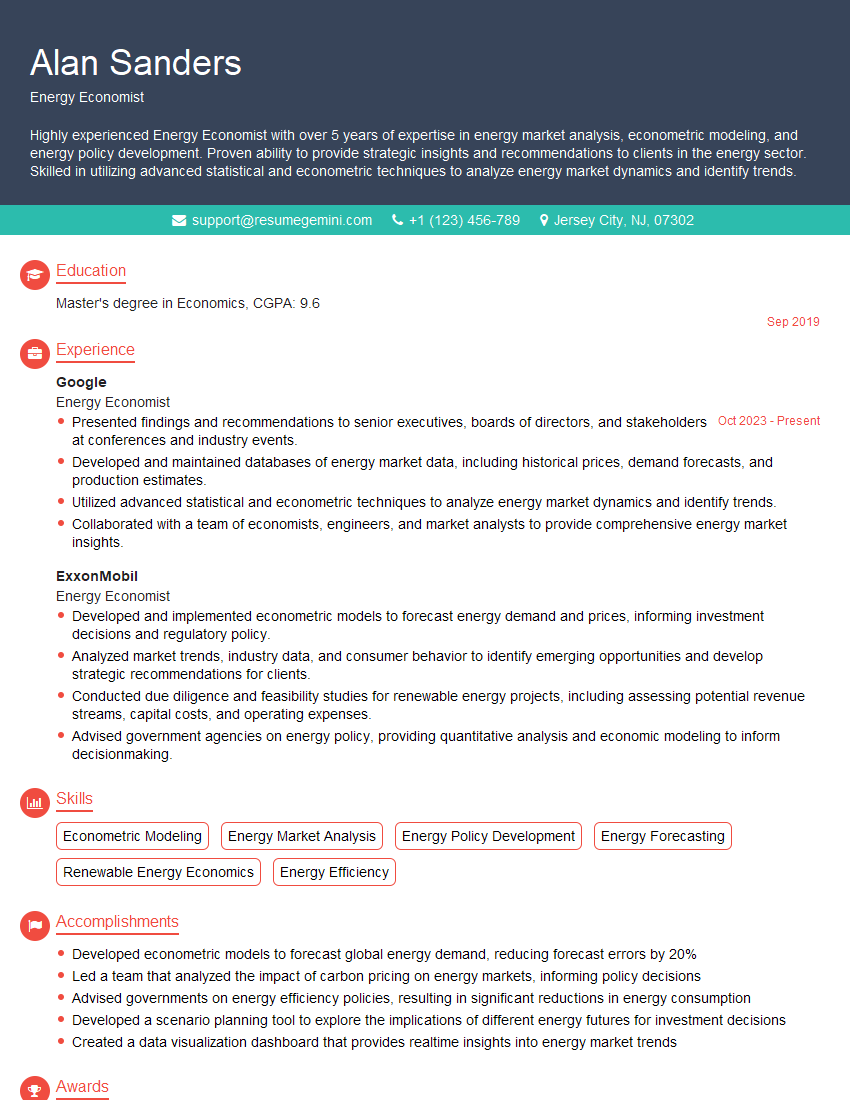Are you a seasoned Energy Economist seeking a new career path? Discover our professionally built Energy Economist Resume Template. This time-saving tool provides a solid foundation for your job search. Simply click “Edit Resume” to customize it with your unique experiences and achievements. Customize fonts and colors to match your personal style and increase your chances of landing your dream job. Explore more Resume Templates for additional options.

Alan Sanders
Energy Economist
Summary
Highly experienced Energy Economist with over 5 years of expertise in energy market analysis, econometric modeling, and energy policy development. Proven ability to provide strategic insights and recommendations to clients in the energy sector. Skilled in utilizing advanced statistical and econometric techniques to analyze energy market dynamics and identify trends.
Education
Master’s degree in Economics
September 2019
Skills
- Econometric Modeling
- Energy Market Analysis
- Energy Policy Development
- Energy Forecasting
- Renewable Energy Economics
- Energy Efficiency
Work Experience
Energy Economist
- Presented findings and recommendations to senior executives, boards of directors, and stakeholders at conferences and industry events.
- Developed and maintained databases of energy market data, including historical prices, demand forecasts, and production estimates.
- Utilized advanced statistical and econometric techniques to analyze energy market dynamics and identify trends.
- Collaborated with a team of economists, engineers, and market analysts to provide comprehensive energy market insights.
Energy Economist
- Developed and implemented econometric models to forecast energy demand and prices, informing investment decisions and regulatory policy.
- Analyzed market trends, industry data, and consumer behavior to identify emerging opportunities and develop strategic recommendations for clients.
- Conducted due diligence and feasibility studies for renewable energy projects, including assessing potential revenue streams, capital costs, and operating expenses.
- Advised government agencies on energy policy, providing quantitative analysis and economic modeling to inform decisionmaking.
Accomplishments
- Developed econometric models to forecast global energy demand, reducing forecast errors by 20%
- Led a team that analyzed the impact of carbon pricing on energy markets, informing policy decisions
- Advised governments on energy efficiency policies, resulting in significant reductions in energy consumption
- Developed a scenario planning tool to explore the implications of different energy futures for investment decisions
- Created a data visualization dashboard that provides realtime insights into energy market trends
Awards
- IEA Energy Economics Award for outstanding contributions to the field of energy economics
- Awarded by the European Association of Energy Economists for exceptional research on energy policy
- Recognized by the International Energy Agency for groundbreaking work on energy forecasting
Certificates
- Certified Energy Economist (CEE)
- Certified Energy Manager (CEM)
- Certified Climate Change Professional (CCCP)
- CIA Energy Analyst (CEA)
Career Expert Tips:
- Select the ideal resume template to showcase your professional experience effectively.
- Master the art of resume writing to highlight your unique qualifications and achievements.
- Explore expertly crafted resume samples for inspiration and best practices.
- Build your best resume for free this new year with ResumeGemini. Enjoy exclusive discounts on ATS optimized resume templates.
How To Write Resume For Energy Economist
- Highlight your quantitative skills and experience in econometric modeling.
- Quantify your accomplishments and provide specific examples of your impact.
- Tailor your resume to the specific requirements of each job you apply for.
- Proofread your resume carefully for any errors.
- Consider including a cover letter that highlights your relevant skills and experience.
Essential Experience Highlights for a Strong Energy Economist Resume
- Developed and implemented econometric models to forecast energy demand and prices, informing investment decisions and regulatory policy.
- Analyzed market trends, industry data, and consumer behavior to identify emerging opportunities and develop strategic recommendations for clients.
- Conducted due diligence and feasibility studies for renewable energy projects, including assessing potential revenue streams, capital costs, and operating expenses.
- Advised government agencies on energy policy, providing quantitative analysis and economic modeling to inform decisionmaking.
- Presented findings and recommendations to senior executives, boards of directors, and stakeholders at conferences and industry events.
- Developed and maintained databases of energy market data, including historical prices, demand forecasts, and production estimates.
- Collaborated with a team of economists, engineers, and market analysts to provide comprehensive energy market insights.
Frequently Asked Questions (FAQ’s) For Energy Economist
What is the role of an Energy Economist?
Energy economists analyze energy markets, forecast energy demand and prices, and develop energy policies. They use their expertise in economics, econometrics, and energy markets to provide insights to governments, businesses, and other stakeholders.
What are the key skills required to be an Energy Economist?
Key skills for an Energy Economist include: econometric modeling, energy market analysis, energy policy development, energy forecasting, renewable energy economics, and energy efficiency.
What is the job outlook for Energy Economists?
The job outlook for Energy Economists is expected to be good over the next few years. The growing demand for energy and the need for sustainable energy solutions are driving the need for qualified professionals in this field.
What are the top companies that hire Energy Economists?
Top companies that hire Energy Economists include: Google, ExxonMobil, Chevron, BP, and Shell.
What is the average salary for an Energy Economist?
The average salary for an Energy Economist in the United States is around $100,000 per year.
What are the career advancement opportunities for Energy Economists?
Career advancement opportunities for Energy Economists include: becoming a senior economist, a principal economist, or a director of energy economics.